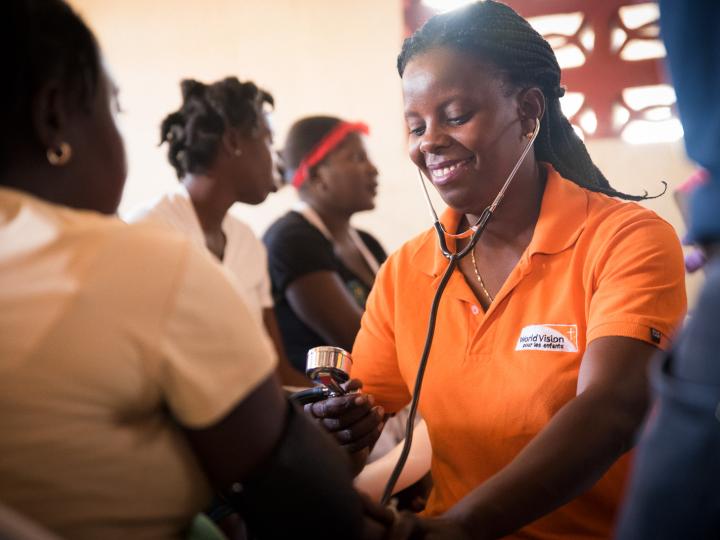Our Work
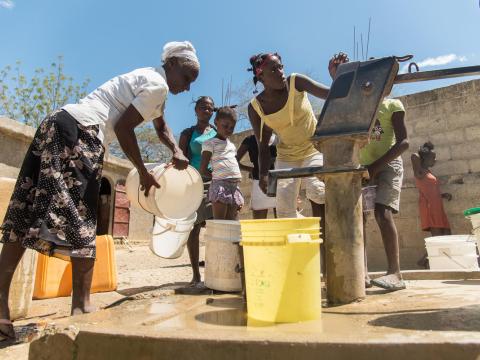
Water, Sanitation and Hygiene (WASH)
In order to improve access to clean water and sanitation, World Vision continued to prioritize water, hygiene, and sanitation within its program. With only 54.4% of most vulnerable families had access to clean water in our area of operation, the objective of focusing on WASH is to reduce the prevalence of preventable diseases, improve health and nutrition conditions, and reduce child protection risk factors. As of 2018, World Vision was able to increase by 19.7% the number of the most vulnerable families that had sufficient access to water from an improved source (protected well or spring, or rainwater collection). Additionally, the proportion of the most vulnerable families using improved sanitation facilities increased by 24.7%. These improvements, among others can be attributed to various achievements:
- More than 222,000 people (of them 15,285 school students) now have access to protected drinking water through the construction and rehabilitation of 144 infrastructures. World Vision supported with the establishment of and training for WASH committees in all new and rehabilitated water points to ensure optimal and continued functionality of water points.
- World Vision efforts to encourage household water treatment and safe storage in communities, schools and health centers led to an additional 18,685 households treating their water with chlorine, effectively reducing the rate of waterborne diseases in the community.
- World Vision engaged more than 72,766 people in hygiene behavior change sessions. As a result of intensive hygiene sensitization and promotion, 7,703 families set up hand-washing stations using buckets with soap and water or tippy taps built from local materials in their homes.
- Families were able to dig their own latrines, and now 7,910 households now have access to basic sanitation facilities, reducing the number of people practicing open defecation in the community. Between 2016 and 2018, 40 communities reached open defecation free status. This accomplishment in part led to a 9.5% reduction of diarrhea prevalence within World Vision intervention areas.
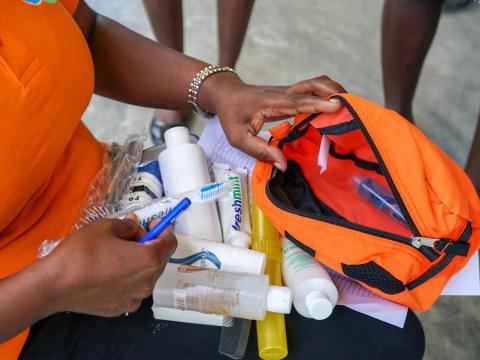
Health and Nutrition
World Vision activities center on addressing key maternal, reproductive and child health and nutrition gaps that adversely affect child well-being within its programs, contributing to improving lives of Haitian children as a whole. One of the major constraints to MCHN (Maternal and Child Health and Nutrition) in the target population is poor infant and young child feeding and care practices, only 54.4% of target most vulnerable families exclusively breastfeed their infants.
Between 2016 and 2018, through a combination of rally posts, mobile clinics, as well as scheduled home visits, WVIH saw many accomplishments, including a 19.4% improvement in the number of children who were being breast-fed until 6 months of age.
Overall, 1,361 rally posts, 191 mobile clinics and 1,025 home visits were conducted, and key highlights from those include:
- World Vision dewormed more than 521,960 school-age children, through several school de-worming campaigns, with the support of the Ministry of Public Health and Population. And 51,116 children under five were also provided with Vitamin A supplement.
- By working with 205 mothers’ clubs, through 121 mobile clinics, 6,929 mothers received lifesaving Maternal and Child Health and Nutrition messaging on breastfeeding, nutrition, and hygiene during pregnancy. These mothers were also able to access antenatal care in mobile clinics. Clubs with lactating mothers also received messages such as water treatment, diarrhea prevention, diarrhea treatment and balanced nutrition for children.
- 1,604 Under 5 Children with Severe and Moderate Acute Malnutrition (SAM/MAM) fully recovered through referral and utilization of appropriate nutriment that was provided by World Vision’s health local partners. Essential micronutrient supplement was provided to health partners as resources to ensure the recovery of these children facing moderate and severe nutrition issues.
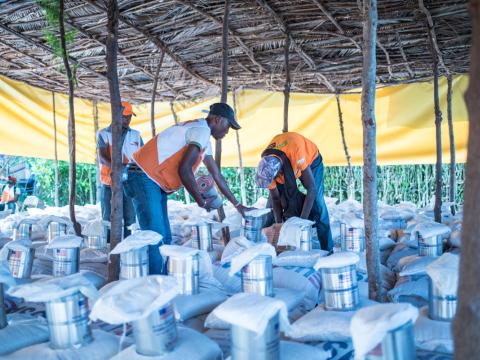
Food Security
Many parts of Haiti are characterized by yearly seasonal food insecurities, and whenever food insecurities occur, children are among the most impacted, especially when common negative coping strategies such as skipping meals or swapping out nutritious foods for cheaper, less nutritious foods are adopted. Thus, it is frequent to find many households not consuming diversified foods, around 38.3% have access to nutritiously diversified foods (roots and tubers, vegetables, fruits, meats).
As a result, every year, World Vision is committed to sustainably address the food insecurity issues, and complement it into its nutrition programming. To achieve this, World Vision works with communities to: promote more diverse and sustainable agricultural livelihoods; facilitate savings and access to micro-credit to enable community members to plan ahead, and contribute subsidiary rural family income especially for the landless and women.
From 2016 to 2018, World Vision implemented myriad activities focusing on agricultural production to ameliorate the food insecurity situations, and in doing so, there was a 25.7% increase in the proportion of households with children who were receiving minimum dietary diversity. Other key highlights include:
- 1,100 families were able to see improvement in their agricultural productions due to distribution of improved seed variety (including pigeon peas, maize, peanut, banana suckers, etc…), and trainings on improved techniques for crop productivity and profitability. Increased productivity and profitability meant that these families were not just able to increase their families’ income, but also improve dietary diversity within their households.
- In partnership with World Food Program, World Vision delivered 2,097 Metric Tons of food (including cereals, beans, oil, peanuts and salt) to 222 schools, through the school feeding project. Therefore, we ensured that 66,600 school students had access to a hot meal when they went to school, contributing to the school retention rate, as well as improved academic performance.
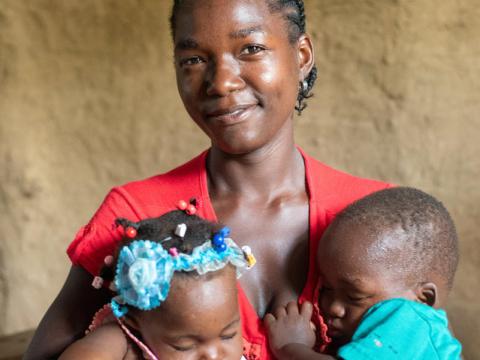
Child Protection
The most vulnerable children in Haiti are critically at risk of violence, and may be subject to trafficking, slavery (restavek), verbal or sexual abuse or exploitation. World Vision, through its advocacy team, has long battled, along with key stakeholders, to lobby for improved legal frameworks that protect children, as well as build a new awareness and paradigm in communities that protect children and their rights.
In 2018, World Vision continued to raise awareness of the consequences of violence against children through community structures.
- Through Citizen Voice and Action and Child Protection and Advocacy initiatives, 10 petitions on protection issues were submitted to local authorities, and Mayors by community leaders.
- 2 community child protection committee structures were supported in the development of their child protection action plan; this plan is to prevent and respond to child protection issues in their communities.
- 5 civil officers including Mayors, and local authorities, 102 midwives and 100 youth were trained by World Vision on birth registration, to promote child protection and services.
- Technical support was provided to partners (Institute of Social Wellbeing and Research and LUMOS) to strengthen their services to the deinstitutionalized.
